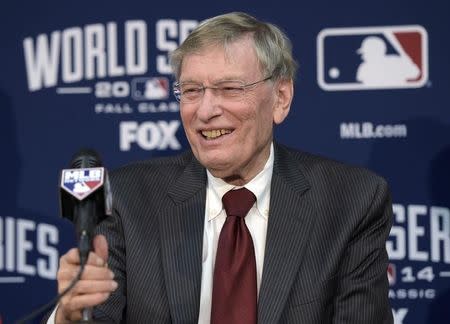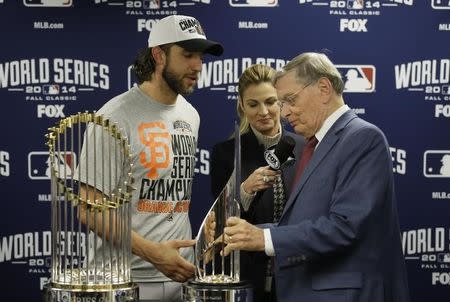Royals' success warms outgoing commissioner Selig's heart
By Larry Fine KANSAS CITY Missouri (Reuters) - In a way, it was fitting for Major League Baseball Commissioner Bud Selig's last World Series in charge to finish in Kansas City. Selig, 80, is ending a 22-year reign as overseer of the game in January, and several of the innovations he instituted paid dividends at the 2014 Fall Classic. In his early days in charge, small market owners clamored for change, complaining that only a handful of wealthier clubs had a chance to win the World Series. Selig, who had been owner of the small-market Milwaukee Brewers, leveled the playing field a bit by introducing revenue sharing, luxury tax on the highest-spending clubs and adding wild cards to the playoff format. All were factors in Kansas City's return to the World Series after a 29-year absence to play fellow wild card San Francisco Giants, who prevailed 4-3 in the best-of-seven championship. "This is a wonderful story, it really is," Selig told a small group of reporters when asked about the Royals after receiving an honorary Hank Aaron Award before Game Four for his contributions to the game. "You’ve all heard me say how much I believe in the hope and faith theory." Selig has long stressed that fans need a basis for optimism when spring and a new baseball season roll around. "The message to me was that 25 teams could not win," he recalled. "This was about 1998. "So the fact that Kansas City is playing, I would be less than honest if I didn't tell you it’s sort of a manifestation (of the economic changes). "I don’t think we’d be drawing 74-plus million people and having these attendance years if we didn’t have lot of franchises like Kansas City, after they went through a terrible drought, as did Pittsburgh. "Watching the emotion in Pittsburgh's ball park last year, sitting at home watching it, I had tears in my eyes," he said about the electric atmosphere as they battled in the Division Series following a 21-year postseason absence. "Because I know what they had gone through and I knew about all the heartache. And the same thing being in Kansas City. Of course it made me feel very good. It’s what we all set out to do and it’s working." Selig acknowledged that other franchises are struggling economically, including Tampa Bay and Oakland, which he blames in part on sub-par stadiums. During his tenure 20 of the 30 major league ball parks have been built, stimulating interest and boosting revenues. "No system is perfect. I guess what I would say to you is if you looked at baseball today and you looked at it in 1992 -- I’d let you draw your own conclusion." Baseball had revenues of just over $1 billion at that time with the figure now approaching $9 billion thanks also to profits from Major League Advanced Media and the launch of the MLB Network. (Editing by Frank Pingue)


